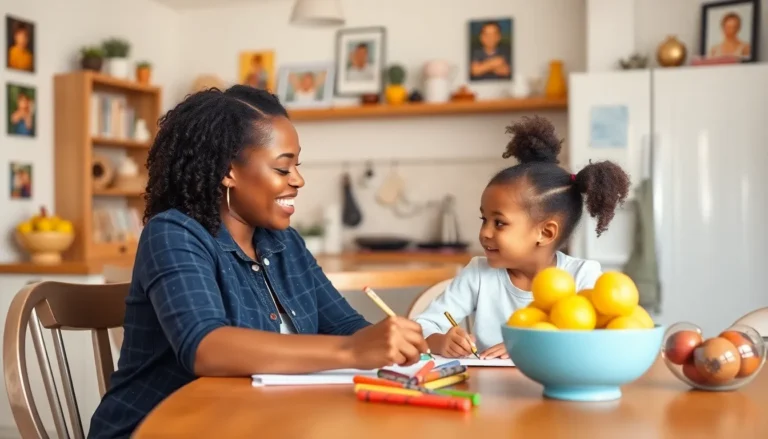Navigating the wild world of parenting can feel like trying to tame a herd of caffeinated squirrels. When it comes to discipline, every parent knows it’s a balancing act between teaching valuable lessons and avoiding a meltdown that rivals a blockbuster movie. But fear not! With the right tips and a sprinkle of humor, discipline can transform from a dreaded chore into an engaging adventure.
Imagine turning those challenging moments into opportunities for growth—both for kids and parents alike. From setting clear boundaries to using creative consequences, effective discipline doesn’t have to be a battlefield. Instead, it can be a fun and enlightening journey that strengthens relationships and fosters respect. So buckle up and get ready to explore practical strategies that make discipline less about punishment and more about teaching kids how to navigate life like pros.
Parenting Tips Discipline
Discipline in parenting serves as a foundational tool for guiding children’s behavior. Effective discipline creates a supportive atmosphere for growth and learning.
The Importance of Discipline
Discipline instills essential values like respect and responsibility in children. Teaching boundaries helps kids understand consequences. A disciplined approach fosters self-control, preparing them for future challenges. Encouraging positive behavior through structured discipline enhances trust and communication. Parents can build strong relationships when children feel secure in their environment.
Different Parenting Styles
Various parenting styles influence discipline strategies significantly. Authoritative parents combine warmth and structure, leading to more positive outcomes. Permissive parents often prioritize nurturing but may struggle with setting limits. Conversely, authoritarian parenting emphasizes strict rules, potentially stifling a child’s independence. Identifying personal styles can guide parents in selecting effective discipline methods. Adjustments in approach may address specific needs in a family’s dynamics.
Effective Discipline Strategies

Effective discipline strategies promote growth and learning while maintaining a nurturing environment. Parents can apply various techniques to encourage positive behavior in their children.
Positive Reinforcement Techniques
Positive reinforcement techniques help to shape desirable behavior. Praising children for good behavior builds self-esteem and encourages repeat actions. Rewards can include verbal affirmations, stickers, or special privileges. Regularly acknowledging achievements reinforces a sense of accomplishment. Consistency in applying positive reinforcement strengthens the bond between parent and child. Engaging in this method fosters an atmosphere where children feel valued and motivated to act appropriately.
Setting Clear Boundaries
Setting clear boundaries allows children to understand expectations. Clearly defined rules provide structure and reduce confusion. Parents benefit from communicating rules consistently and calmly. Regularly revisiting these boundaries ensures that children remain aware of guidelines. When consequences align with actions, children learn accountability. Adherence to established boundaries fosters security, allowing children to feel confident in their choices. This practice promotes respect for authority and encourages self-discipline over time.
Age-Appropriate Discipline
Effective discipline varies significantly based on a child’s age. Understanding these differences helps create appropriate strategies for each developmental stage.
Discipline for Toddlers
Toddlers thrive with simple and clear boundaries. Consistent routines establish security, making it easier for them to understand expectations. Redirecting behaviors works well, as toddlers often explore without awareness of consequences. Using brief timeouts can provide moments for reflection when necessary. Offer praises for positive behaviors to reinforce desired actions. Such encouragement builds confidence while instilling respect. Lastly, modeling emotions teaches toddlers how to express feelings appropriately.
Discipline for Adolescents
Adolescents benefit from more complex discussions about behavior. It’s crucial to foster open lines of communication, allowing children to express their thoughts and feelings. Negotiation can play a key role in setting boundaries, giving them a sense of ownership. Establishing consequences gives clear direction on the impact of choices, promoting responsibility. Encouragement during challenges bolsters resilience and self-esteem. Lastly, acknowledging their growing independence while providing guidance creates a balanced approach to discipline.
Common Discipline Mistakes to Avoid
Discipline strategies require careful consideration to avoid common pitfalls. Parents can optimize their approach by acknowledging frequent mistakes.
Overreacting to Behavior
Overreacting can exacerbate a child’s behavior instead of correcting it. Sudden outbursts might instill fear rather than respect. Remaining calm strengthens trust and communication between parent and child. Evaluating situations critically without jumping to conclusions provides clarity and fosters understanding. Effective responses focus on addressing behavior, not launching emotional reactions. Parents can model self-control, teaching children how to manage their emotions better. Ultimately, a measured approach encourages a supportive environment for growth.
Inconsistency in Rules
Inconsistency undermines the effectiveness of discipline. Children thrive on clear, established boundaries. Parents that frequently change rules create confusion, making it hard for kids to understand expectations. Maintaining consistent guidelines helps children recognize responsibility and accountability. Consistent consequences reinforce the connection between actions and outcomes. Using the same approach across various situations supports learning and self-discipline. Parents should regularly communicate rules and revisit them when necessary, facilitating a stable framework for behavior.
Conclusion
Effective discipline is more than just correcting behavior; it’s about nurturing growth and fostering strong relationships. By embracing the challenges of parenting and viewing them as opportunities, parents can create a supportive environment where children learn essential life skills.
Setting clear boundaries and using positive reinforcement can transform discipline into a constructive experience. Understanding individual parenting styles allows for tailored strategies that resonate with each child’s unique needs.
Consistency in communication and rules is vital for instilling accountability and respect. By focusing on guidance rather than punishment, parents can cultivate resilience and self-discipline in their children, paving the way for a harmonious family dynamic.




